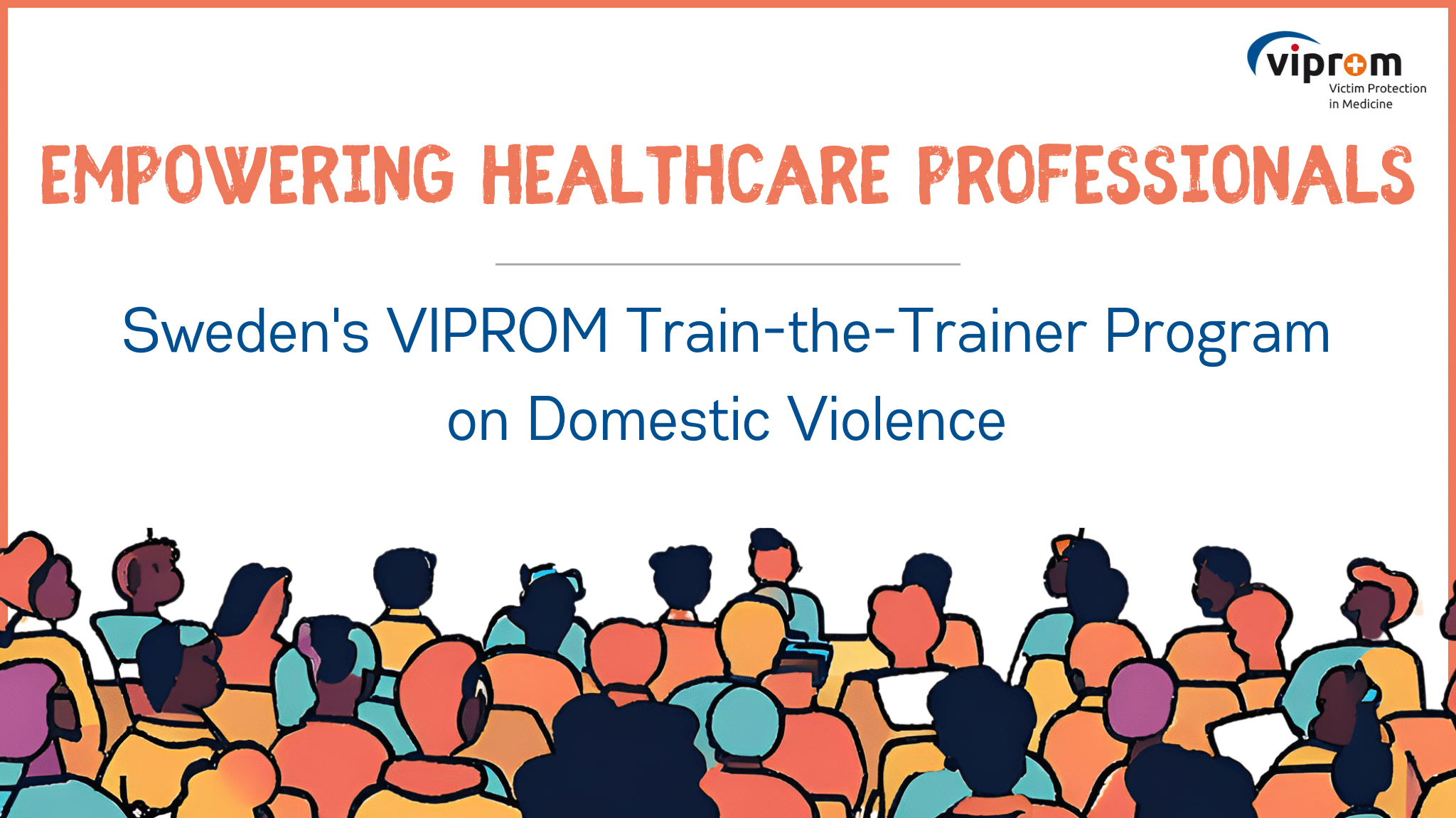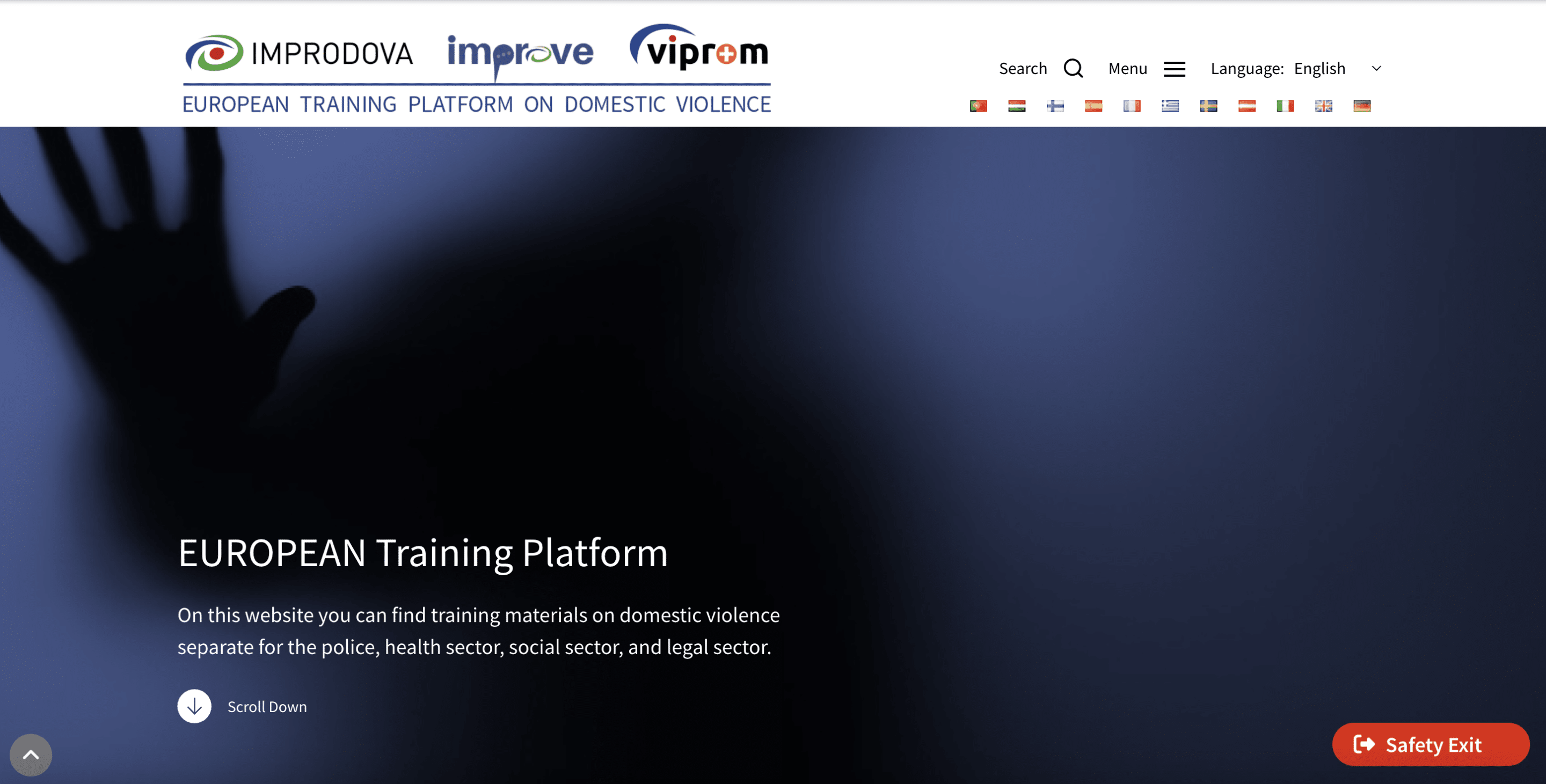
Image created by AI
“Healthcare professionals are key to identifying domestic violence, but without the right questions and guidance, recognising and responding to abuse remains a challenge.”
The Swedish partners in VIPROM have successfully conducted the first of two training days in the Train-the-Trainer (TtT) program for clinicians in Sweden. The group of future trainers includes three doctors with 2–5 years of teaching experience, three nurses, a psychologist, and a study director, all with 2–10 years of teaching experience. The first part of the training covered the presentation of the curriculum and the platform for educational materials, along with interactive methods such as reflections, role-plays, and group discussions. This led to many fruitful conversations, where the future trainers shared valuable insights and reflections on teaching about the sensitive topic of domestic violence (DV). This part of the training in Sweden is set to conclude at the end of October 2024.

The Swedish partners are very pleased to have come this far in the VIPROM project, which aims to improve competence and understanding domestic violence within the healthcare sector. The implementation of sustainable knowledge about DV within healthcare is crucial to ensure that victims receive the support and assistance they need, regardless of the individual key personnel available. If knowledge and expertise on this subject rely solely on a few individuals who have chosen to specialise in it, a vulnerability is created within the system. This vulnerability risks leading to inconsistencies and shortcomings in the support offered to patients. By implementing this training program for clinicians, we are ensuring that they are better equipped to provide consistent, informed, and compassionate care.
QUALITY ASSURANCE – A GUIDING HANDBOOK AND EVALUATION OF THE PROGRAM
In order to make sure that the training is conducted according to the curricula the future trainers will also have access to a handbook that contains all the information they need about the educational material, which is divided into nine modules. This resource is designed to guide them through the training process, providing clear descriptions of each module’s content, objectives, and learning outcomes. The handbook serves as a tool for both understanding the curriculum and facilitating effective learning, ensuring that participants can fully engage with the material and apply their knowledge in practice.

Another essential component in the VIPROM project is the piloting of the curricula developed within the study project. This process will unfold in three phases where the first step is to train the trainers and to pilot the curricula in each partner country. The next step is to train peer trainers across five partner countries, followed by peer-to-peer piloting with representatives from each stakeholder group. This allows for a rigorous evaluation, enabling us to optimise the training that we intend to disseminate.
NCK’S LONG TRADITION OF EDUCATING ON INTIMATE PARTNER VIOLENCE (IPV)
The National Center for Knowledge on Men’s Violence Against Women, NCK, in Sweden has a history of addressing domestic violence through education and training. Established to promote awareness and provide resources, NCK has been at the forefront of developing curricula and programs aimed at equipping healthcare students among others with the knowledge and skills necessary to identify and address issues of IPV.

In 2018, a major milestone was reached when it became mandatory for students in eight university programs in Sweden to study DV. This legislative change marked a pivotal moment in education, ensuring that future professionals are prepared to engage with and support individuals affected by DV.
We are enthusiastic that through the VIPROM project, we can extend this crucial knowledge to practicing clinicians. By bridging the gap between newly graduated students and those currently in the field, we aim to facilitate the implementation of this education in clinical settings. This collaboration will help ensure that the insights and skills acquired by new graduates are effectively utilised, ultimately enhancing the support provided to individuals facing DV.
SUSTAINABLE KNOWLEDGE ON DV AND ITS BENEFITS FOR PATIENTS
When domestic violence is identified and addressed appropriately, it can mitigate the negative consequences for those affected. Therefore, it is important to integrate knowledge of this complex issue into the regular training and continuing education of healthcare professionals. By creating a shared understanding and standardised procedures, we can ensure that everyone working in healthcare has the necessary competence to recognise signs of DV, ask the right questions, and provide adequate support.
Moreover, broad implementation of this knowledge helps normalise discussions about DV and its consequences. This, in turn, can make it easier for patients to seek help and for healthcare staff to take action. When multiple individuals within a healthcare organisation are trained to handle these issues, the risk of victims falling through the cracks is reduced.

To build a robust and sustainable support system for victims of DV, a strategic effort is required to disseminate knowledge and create a culture where issues related to DV are taken seriously. This includes not only training staff but also establishing structured routines for addressing these matters. By integrating knowledge into healthcare as a whole, we can ensure that support for patients is both competent and consistent, ultimately increasing the chances of positive outcomes for those affected domestic violence.
IMPORTANT CHALLENGES
One potential barrier to engaging the clinicians is the assumption that health professionals should only inquire about DV when there is a suspicion of it. We aim to emphasise the importance of routinely asking patients about DV, regardless of the circumstances.
Another challenge is the uncertainty or lack of clarity regarding one’s own role and obligations, which may influence whether to address the topic of DV. We plan to tackle these barriers by highlighting that DV can lead to a range of health consequences—both long-term and short-term—and that these effects can be diffuse. As a result, relying solely on specific indicators may be insufficient, given their diversity. We will also clarify the critical role healthcare plays in addressing DV.
MORE INFORMATION ON DOMESTIC VIOLENCE
If you are interested to learn more about domestic violence in the health sector, please visit our European training platform on domestic violence.
ABOUT THE AUTHOR

Dr. Susanne Mattsson is a researcher and lecturer at the National Centre for Knowledge on Men’s Violence Against Women, NCK, at Uppsala University, where she focuses on issues related to intimate partner violence. She also serves as project leader for a multidisciplinary research network at the university. With years of experience in therapeutic treatment for women who have experienced domestic violence and sexual abuse, Susanne is dedicated to advancing understanding in this critical area. She engages in research concerning the aftermath of IPV and the support systems available to individuals that has been subjected to this.
 This project has received co-funding from the European Union’s CERV-2022-DAPHNE programme under grant agreement No. 101095828.
This project has received co-funding from the European Union’s CERV-2022-DAPHNE programme under grant agreement No. 101095828.
Newsletter
Please subscribe here for the VIPROM newsletter:
